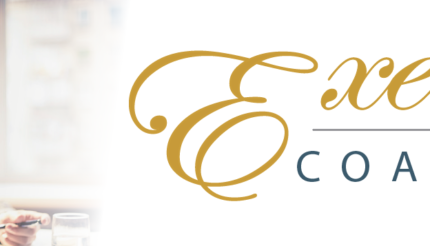Well, do I?
Simply put, Executive Coaching provides content, process, and attitude to help leaders improve and sustain results.
Leaders are already highly-effective people in positions with significant responsibility.
They may run large companies, have profit and loss responsibility for divisions in companies. The leader may be starting up a venture-backed enterprise. You could be transitioning to a new role, be launching an ambitious new product or project, or leading hundreds of employees.
Does this sound like you?
Leaders are seasoned, often highly educated and have a track record of major achievements. They are driven, ambitious executives who benefit from an objective, trusted adviser. He will have a with a toolkit that can help them continue their success and overcome ever-larger hurdles.
Help…
Executive coaches help these high-powered people get results because they have content, processes, and attitudes that improve performance, typically in a series of short, high-impact meetings over time.
The executive coaches content is a toolkit of distinctions, frameworks, and definitions that help executives see challenges and situations in new ways, and develop flexibility and effectiveness in how they get results.
The Coaches Toolkit includes processes on…..
- setting and achieving goals
- influencing others
- communicating powerfully
- eliminating blind spots
- motivating employees
- building alliances
- thinking strategically
Our process
An executive coach uses processes that help clients get results in a short amount of time. These processes include a series of coaching conversations that create ‘Light bulb Moments’ moments for Executive.
Sometimes the coach does this by asking questions through a process called an inquiry. Other times the coach makes direct suggestions and then engages in a dialog with the client.
Similarly, the coach often provides 360-degree feedback, assessments, and other forms of data to make the case to the client for the need to improve and change.
The executive coach also models a set of attitudes that create a context and environment for improving performance. These attitudes include complete professionalism, a focus on results, and taking a stand for the client’s most ambitious aspirations.
The Result
Ultimately, the coach is measured by how well his or her clients improve and sustain results. Results are measurable improvements in performance and the executive coaching process ALWAYS includes metrics to track performance over time.
However, results alone are not sufficient. The true executive coach gets results that last. In other words, he or she doesn’t just step in and do the work for the client or create a brief uplift in performance.
Rather, he or she creates a lasting shift in the client, so that the client develops new capacities to perform.
The Overlap
Executive coaching overlaps with, yet differs from business coaching. Both disciplines focus on getting results in organisations, recruiting and developing talent, building teams, and achieving extraordinary results.
However, the business coaching client primarily needs to create a viable business that runs without him or her. He or she probably runs a simpler operation with fewer resources than the executive coaching client.
Also, sometimes (but not always!) he or she doesn’t have the level of business sophistication or education of the typical executive coach. If the business coaching client is steering a 20’ boat, the executive coaching client is steering a Cruise Ship.
While the executive coaching client often gets caught up in fighting daily fires, he or she lives or dies based on the ability to get results through people, recruit and develop talent, think and plan strategically, and navigate the complex politics of the organisation.
He or she probably (but not always!) already have a viable organisation with systems that provide leverage, and now needs to take the organisation and its people to the next level.
Compared to business coaching, an executive coach tends to focus much more on strategic planning and leadership capabilities than on the basic tactics for growing revenue and profits. Because of this focus, executive coaches often find themselves working not only in large for-profit enterprises, but also at universities, non-profits, foundations, and government entities.
Executive Coaching
Executive coaching also must be distinguished from therapy, training, mentoring, facilitator, and consulting. While the best executive coaches wear the hat of the trainer, mentor, facilitator, and consultant (but not therapist) when appropriate, these activities are very different than executive coaching.
At the same time, executive coaches often find that their clients share with the issues about their personal health, marriage or romantic relationships, a recent death or tragedy in the family, financial concerns, and similar personal issues.
It isn’t therapy
The executive coach is not a marriage counsellor, financial planner, or alternative health specialist. While he or she should listen to and empathise with these concerns (as distractions outside of work always impact performance at work), the coach must make it clear to the client when intervention by an additional professional might be appropriate.
Training is an activity that involves working with people to improve behaviours and attitudes, generally through repetition and practice. The executive coach can wear the hat of a trainer, especially to introduce a new skill, role play and rehearse with the client; In fact, many executive coaching engagements lead to assignments to provide a training session for the executive or management team.
However, while training programs are often “off-the-shelf” and scripted, executive coaching is much more customised and improvisational.
Mentoring
Mentoring happens when a seasoned executive guides a less seasoned person. The mentor has “been there and done that.” He or she shares subtle wisdom and insights with the “mentee,” and often opens doors. Mentor relationships can be formal (as when the HR department assigns mentors) or informal (e.g., the wise executive always seeks out mentors).
The executive coach can use mentoring from time to time as a way to share war stories and examples from his or her experience. However, the coach is more of an equal and a trusted adviser than a mentor. Mentoring is one of the many tools that the coach uses.
Facilitating
Facilitators help groups reach clarity and make decisions. The best executive coaches know when to offer their services as facilitators. For instance, many executive coaches facilitate strategic retreats, project kick-offs, and executive team meetings when asked.
They also mediate the conflict between members of the executive team when appropriate. Again, facilitation is a skill that comes in handy for the executive coach but is not executive coaching.
Consulting
Finally, consulting is a more in-depth, lengthy process than coaching. Consulting involves diagnosing an organisational challenge, conducting analysis, and solving challenges on behalf of the client.
Most consultants provide coaching as part of their engagement, especially when they present findings one-on-one to their client and help the client confront the need for change and how to make a change. Similarly, many executive coaches do some consulting. For instance when they conduct research to understand whether an executive team is aligned, or when they assess a company’s leadership development process.
However, executive coaches, for the most part, require the client to conduct their own research, draw their own conclusions and set their own path. The coach is there to ask powerful questions, make suggestions and observations when appropriate, provide tools, and lead the client towards a successful course of action and improvement.
Coaching is a more focused, intense activity. However, the more that the coach can think logically as if he or she were a consultant, the more powerful his or her questions and advice will be.
Find out more about Executive 1-2-1 coaching by getting in touch with me today.
Book a 15 minute call here Message me at ianfinney@actioncoach.com or fill in the contact form by clicking here.
You could even just call me on 07716 292378






